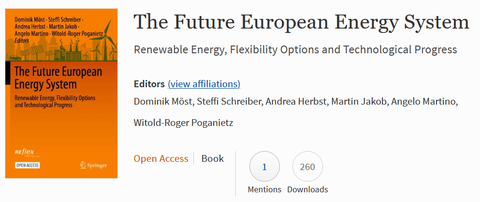Feb 26, 2021
Open Access Book Publication - The Future European Energy System
The future energy system in Europe needs to be decarbonized and thus based almost exclusively on renewable energy sources. Therefore, it is challenged by the intermittent nature of renewables and requires several flexibility options such as storages, demand side management applications, power-to-x technologies. Nevertheless, the interaction between different options, the optimal portfolio and the impact on environment and society were unknown until now and were therefore in the focus of the European Horizon 2020 research project REFLEX - “Analysis of the European energy system under the aspects of flexibility and technological progress” to support the implementation of the European Strategic Energy Technology Plan (SET-Plan).
The REFLEX results and recommendations for action that will help decision-makers in politics to successfully implement the European Strategic Energy Technology Plan (SET-Plan) are summarized in the open-access book publication “The Future European Energy System - Renewable Energy, Flexibility Options and Technological Progress”.
https://doi.org/10.1007/978-3-030-60914-6
The book analyses the transition toward a low-carbon energy system in Europe under the aspects of flexibility and technological progress. By covering the main energy sectors – including the industry, residential, tertiary and transport sector as well as the heating and electricity sector – the analysis assesses flexibility requirements in a cross-sectoral energy system with high shares of renewable energies. The contributing authors – all European energy experts – apply models and tools from various research fields, including techno-economic learning, fundamental energy system modelling, and environmental and social life cycle as well as health impact assessment, to develop an innovative and comprehensive energy models system (EMS). Moreover, the contributions examine renewable penetrations and their contributions to climate change mitigation, and the impacts of available technologies on the energy system.
Besides a strong carbon price incentive, results show that the following four main pillars are the basis of a successful climate-neutral transformation of the energy system in the next decades:
- (Significant) increase of renewable energy sources (RES) to generate almost CO2-neutral electricity as called for in the European Green Deal—a factor of 4 to 6 of today’s RES installations in 2050. Challenges occur to integrate these large amounts of additional renewable energy sources. Results have shown that in the High–RES decentralized scenario demand side flexibility (e.g. PV–battery systems, battery electric vehicles, heat pumps, etc.) is more important than in the High–RES centralized scenario, where infrastructure for sector coupling as well as power grids play a crucial role. In both High–RES scenarios back-up capacities are still highly relevant.
- Increase of energy efficiency to reduce energy consumption while maintaining the energy service levels and thus contributing to a lower energy demand at all scales and sectors (industry, mobility, buildings etc.).
- Increase of electrification by means of sector coupling (power-to-x technologies), to make use of higher shares of renewable energy sources for providing heat and mobility services.
- Use of CO2-neutral hydrogen for energy services in particular in industry and for energy needs with high energy density.
Given its scope, the book appeals to researchers studying energy systems and markets, professionals and policymakers of the energy industry and readers interested in the transformation to a low-carbon energy system in Europe.
|
Book title |
The Future European Energy System Renewable Energy, Flexibility Options and Technological Progress |
|
DOI |
|
|
Print ISBN |
978-3-030-60913-9 |
|
Project title |
Analysis of the European energy system under the aspects of flexibility and technological progress |
|
Acronym |
REFLEX |
|
Project duration |
2016-2019 |
|
Contact |
Chair of Energy Economics Prof. Dr. Dominik Möst |
|
Coordinator |
TU Dresden (Chair of Energy Economics and EPC – European Project Centre) |
|
Financing |
European Commission (within the scope of Horizon 2020 – LCE21) |
|
Website |
|
|
Data Warehouse |
The REFLEX project was embedded in the EU Horizon 2020 Work Program “Secure, clean and efficient energy” and addressed the topic LCE-21-2015 “Modelling and analysing the energy system, its transformation and impacts” during the project duration from May 2016 until April 2019. Thereby nine partners from six European countries contributed with their expertise, especially in energy system modelling, technological progress and life cycle assessment, to the successful project implementation, in particular: TU Dresden, (Chair of Energy Economics and European Project Centre) as coordinators, Energy Systems Analysis Associates—ESA2 GmbH (Dresden), Fraunhofer Institute for Systems and Innovation Research (Karlsruhe), Karlsruhe Institute of Technology (Karlsruhe), Royal Institute of Technology (Stockholm), TEP Energy GmbH (Zurich), TRT Trasporti e Territorio (Milano), University of Science and Technology—AGH (Krakow) and Utrecht University (Utrecht).

